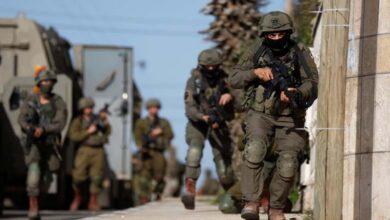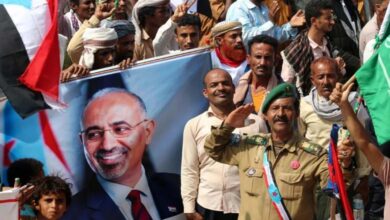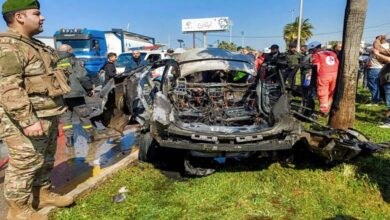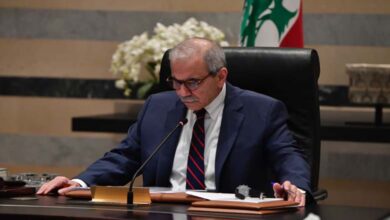Mikati Calls for Shielding Lebanon from ‘Lethal Collapses’
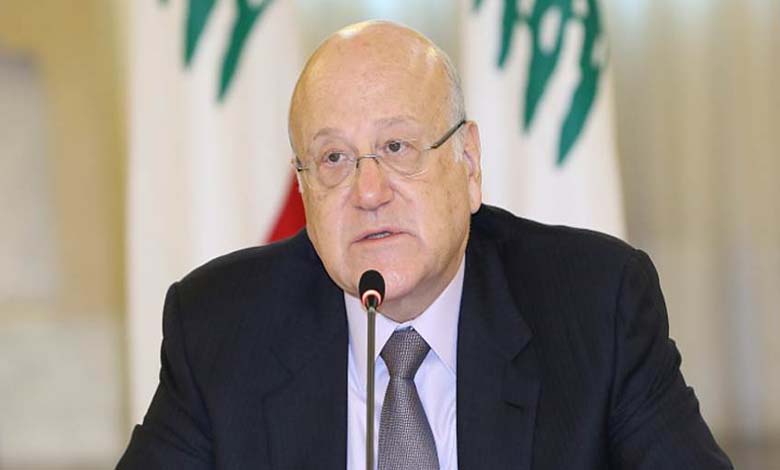
Najib Mikati, the Lebanese caretaker prime minister, called on everyone today, Thursday, to “unite to shield Lebanon from lethal collapses,” affirming that “scenes of blood and murder in Gaza cannot extinguish the truth.”
The “National News Agency” quoted Mikati as saying during his intervention in a cabinet session held today, “We are collectively bearing the responsibility of caretaking, facilitating people’s affairs, protecting the country, and fortifying the institutions.”
Mikati pointed out that “the war in Gaza and the Israeli attacks in the south were the focus of my speech at the Arab and Islamic summit, and all kings and presidents were responsive, aware of the risks of the situations and their developments.”
He added, “All these challenges and dangers make us look deeper and think more about our internal situation, always emphasizing the necessity of electing a president for the republic as soon as possible, to complete the formation of institutions and work together to make Lebanon stronger and more resilient.”
Mikati said, “Through my international meetings, it has been confirmed to me that everyone cares about Lebanon; our Lebanon is an Arab need and a cultural necessity, and it is our duty to protect our homeland with unity and avoid fragmentation.”
The dispute over who will occupy the seat designated for the Maronite sect, the largest Christian sect in the country, has plunged Lebanon into the presidential vacuum for about a year amid severe economic and political crises affecting the lives of the Lebanese.
Mikati also noted that the global public opinion “has begun to understand this humanitarian issue and the dimensions of the Israeli aggression in Gaza, which targets civilians and hospitals and destroys all the essentials of life,” pointing out that “the decision issued yesterday by the Security Council marks the beginning of a ceasefire and a diligent effort to exchange civilian prisoners as a first step, paving the way for a final ceasefire.”
Mikati affirmed that “some are trying to reintroduce the government into debates that appear constitutional and political but are essentially obstructive and monopolistic,” emphasizing “moving forward with work and avoiding sterile arguments that weary the Lebanese.”
He clarified that “the government works according to what it deems appropriate, not according to agendas that some try to impose on fundamental entitlements in this critical stage,” pointing out that any decision regarding any urgent entitlement will be primarily based on the interest of the nation and the priority of fortifying institutions in this critical stage.”
Mikati stressed that “the government will not be an arena used by those who want to settle personal scores and individual disputes at the expense of the public interest.”
Israel and the Lebanese Hezbollah, stationed in the south, have maintained implicit rules of engagement imposed since their last escalation in 2006.
Hezbollah Secretary-General Hassan Nasrallah announced in two media appearances since the beginning of the escalation in Gaza that the party is participating in the ongoing war and is ready to escalate if necessary.
The party targeted Israeli military sites along the front in Lebanon, but its operations have become more in-depth in the past few days.
Since the beginning of the escalation, 88 people have been killed in Lebanon, including 65 Hezbollah fighters and ten civilians, according to a tally collected by Agence France-Presse.








